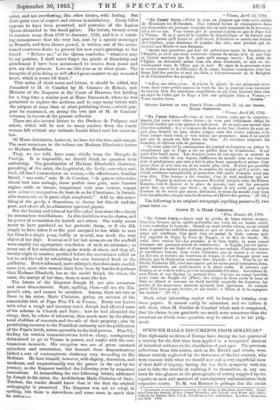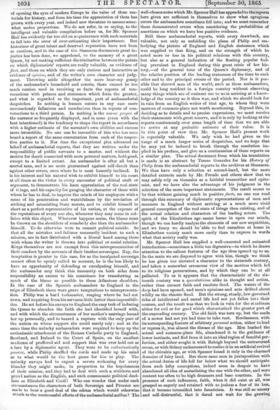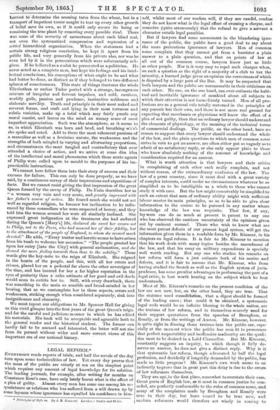SPENCER HALL'S DOCUMENTS FROM SIMANCAS.* Tun diplomatic archives of Europe
have during the last quarter of a century for the first time been applied as a recognized element of historical evidence to the elucidation of past ages. The previous collections from this source, such as Dr. Birch's and others, were almost entirely neglected by the historians of the last century, who were content with what we should now call a very superficial view of their field of inquiry, having far too little sympathy with the past to take the trouble of realizing it to themselves, as any one must do who glances at the photographs of society supplied by the reports on men and manners of contemporary ambassadors to their respective courts. To M. von Raumer is perhaps due the credit
• Documents from Sinewscas relating to the Ileign of Elizabeth (1558.1508). Trans. fated (roil the Spanish of Don Tomas Gousalez, an4 Edited, with Notes and Intro-
duction. by Spenser Hall, Librarian to tins Athena:min. Landon Chapman and Hall. 1365.
of opening the eyes of modern Europe to the value of these ma- terials for history, and from his time the appreciation of them has grown with every year, and indeed now threatens to assume some- what undue proportions. We do not refer, in so saying, to the intelligent and valuable compilation before us, for. Mr. Spencer Hall has evidently far too old an acquaintance with such materials to fall into the error of over-estimating their importance. But historians of great talent and deserved reputation have not been so cautious, and in the case of the Simancas documents great in- justice has been done, we apprehend, to the memory of a great Queen, by not making sufficient discrimination between the points on which diplomatists' reports are really valuable, as evidence of fact, and those on which they are only curious and instructive as evidence of opinion, and of the writer's own character and judg- ment. Throwing aside altogether the mere hear-say gossip of the ambassador's household and coterie, there cannot be too much caution used in receiving as facts the reports of con- versations with princes and statesmen which form the greater,, and what is regarded as the important, part of ambassadorial despatches. In nothing is human nature in any case more unconsciously fallacious and mendacious than in reports of con- versations to a third person. In nothing is the amour propre of the narrator so frequently displayed, and in none (even with the best intentioned) is the tendency to shape the report in accordance with a higher estimate of the narrator's own abilities and success more irresistible. No one can be insensible of this who has once heard a report of the same conversation from each of the respec- tive parties to it. Nor does the exceptional plea advanced on behalf of ambassadorial reports, that they are written under the responsibility of public servants to a master, and without the motive for deceit connected with mere personal matters, hold good, except to a limited extent. An ambassador is after all but a mortal man, and is no more guaranteed against self-deceit than against other errors, even where he is most honestly inclined. It is his interest and his natural wish to exhibit himself to his court at all times as the victor in every encounter of political craft or argument, to demonstrate his keen appreciation of the real state of things, and his capacity for gauging the character of those with whom he has to deal, to impress the minds of his employers with a sense of his penetration and watchfulness by the revelation of striking and astonishing State secrets, and to exhibit himself in short as a perfect representative of his nation, at the expense of the reputations of every one else, whenever they may come in col- lision with this object. Whatever happens amiss, the blame must be thrown on the shoulders of somebody else than the ambassador himself. To do otherwise were to commit political suicide. So that all the mistakes and failures necessarily incident, to such a mission, are in fact distributed with a liberal hand among those with whom the writer is thrown into political or social relation. Kings themselves are not exempt from this misrepresentation of their conduct by the servants of their brother sovereigns. Nay, the temptation is greater in this case, for as the inculpated sovereign cannot often be openly called to account, he is the less likely to have an opportunity of defending or exculpating himself, and the ambassador may think this immunity on both sides from responsibility an excuse to his conscience for transferring as much of the blame as possible to these Atlantean shoulders. In the case of the Spanish ambassadors to England in the reign of Elizabeth there were grave temptations to misrepresenta- tion. Philip was a hard taskmaster, reaping where he had not sown, and requiring from his servants little better than impossibili- ties. He set before his envoys to England the easy task of inducing the Queen to abandon the faith she had identified herself with, and with which the circumstances of her mother's marriage bound her up personally, and to hazard a rupture with the only part of the nation on whose support she could surely rely; and at the same time the unlucky ambassadors were required to keep up the enthusiastic attachment of the Roman Catholic party in England, Scotland, and Ireland to the Court of Spain, on the smallest modicum of proffered aid and support that was ever held out as a lure by a diplomatic agent. They were to be enthusiastically passive, while Philip shuffled the cards and made up his mind as to what would be the best game for him to play. The unlucky envoys had to expect a severe reckoning for every blunder they .might make, in proportion to the hopelessness of their mission, and they had to deal with such a stubborn and proud nation as the English, and such consummate political duel- lists as Elizabeth and Cecil! Who can wonder that under such circumstances the characters of both Sovereign and Premier are male to bear a good deal of the odium which would otherwise attach to the unsuccessful efforts of the ambassadorial scribes ? The well-chosen notes which Mr. Spencer Hall has appendedto thereports here given are sufficient in themselves to show what egregious errors the ambassadors sometimes fell into ; and we must remember these demonstrated errors when considering the probabilities of assertions on which we have less positive evidence.
Still these ambassadorial reports, with every drawback, are valuable, not only as unfolding the plans of Philip and em- bodying the picture of England and English statesmen which was supplied to that King, and on the strength of which he acted more or less in his political relations with this country, but also as a general indication of the floating popular feel- ing prevalent in England during this great crisis of her his- tory,—of the general tone of the Queen's diplomacy, and of the relative position of the leading statesmen of the time to each other and to the principal events of the period. Nor is it pos- sible that shrewd men of the world, such as these ambassadors, could be long resident in a foreign country without observing many things which are of eminent use to us in arriving at a know- ledge of the country as it then was, and which we should look for in vain from an English writer of that age, to whom they were matters of common-place not worth mentioning. Beyond this, in deciding as to details and to precise expressions, we must receive their statements with great reserve, and it is only by looking at the reports continuously over some length of time that we are able to arrive at any probable estimate of their value. It is in this point of view that Mr. Spencer Hall's present work is especially valuable. We only wish he had given us the range of a much longer series of despatches, and we hope that he may yet be induced to break through the resolution im- plied in his preface, and give us a continuation of these reports on a similar plan. The actual document from which his translation is made is an abstract by Tomas Gonzalez for his History of Philip from the ambassadorial reports in the archives at Simancas. We thus have only a selection at second-hand, but the more detailed extracts made by Mr. Froude and others show that we may safely rely on Gonzalez as a faithful transcriber and epito- mist, and we have also the advantage of his judgment in the selection of the more important statements. The result seems to be that without gaining much in positive facts, no one can read through this summary of diplomatic representations of men and manners in England without arriving at a much more vivid general conception of the real state of things then existing, and of the actual relation and characters of the leading actors. The spirit of the Elizabethan age. seems borne in upon our minds, though we can hardly analyze the elements of our new acquisition, and we fancy we should be' able to feel ourselves at home in Elizabethan society much more easily than to express in words what that society really was.
Mr. Spencer Hall has supplied a well-executed and animated introduction—sometimes a little too digressive—in which he draws attention to the salient features of the age thus opened up to us. In the main we are disposed to agree with him, though we think he has given too elevated a character to the sixteenth century, and taken a somewhat erroneous view of the motives which led to its religious persecutions, and by which they can be at all palliated. To us it appears that the characteristic of the six- teenth century was a speculativism alike in thought and action, rather than earnest faith and resolute deed. The waters of the deep had been opened, and men's opinions and acts drifted about wildly on the chaotic flood. But the strong, steady, law-governed tides of intellectual and moral life had not yet fallen into their courses, and the result was that we look in vain for the steadiness either for evil or for good which characterized the greater part of the sue,ceeding century. The old faith was torn up, but the seeds of a newer had not yet had time to take root. Restlessness, with its corresponding feature of arbitrary personal action, either to lead or repress it, was almost the disease of the age. Men loathed the actual and common-place life, abandoned it to the guidance of lower instincts, and fled from it into an ideal region of fanciful per- fection, and either sought it with Raleigh beyond the untraversed ocean, or with Sidney endeavoured to realize it in an artificial revival of the chivalric age, or with Spenser found it only in the charmed domains of fairy land. But these same men in juxtaposition with the actual duties of life fell far below what we should anticipate from such lofty conceptions, indeed seem in despair to have abandoned all idea of assimilating the one with the other, and were content too often to be high dreamers and base courtiers. In the presence of such influences, faith, when it did exist at all, was grasped so eagerly and retained with so jealous a fear of its loss, that it became intensified into fanaticism. It was still so uneasy and self-distrustful, that it dared not wait for the growing harvest to determine the seeming tares from the wheat, but in a transport of impatient terror sought to tear up every other growth of belief save its own, as if it could only secure its being or remaining the true plant by removing every possible rival. There was none of the maturity of earnestness about such blind zeal, not even the systematized compression and repression of a settled hierarchical organization. When the statesman had a certain strong religious conviction, he kept it apart from his public life, and very generally from his private also, nor was he even led by it in the persecutions which were substantially reli- gious. If he believed as a zealot he persecuted as a politician. He never acted as a complete man, but kept his feelings and his intel- lectual conclusions, his conceptions of what ought to be and what had better be done, as distinct as if they belonged to two different spheres of consciousness. This state of things tinctures the whole Elizabethan or rather Tudor period with a strange, incongruous mixture of irregular and fervent impulses, and. cold, cautious, worldly guile, passion and prudence, instinctive nobleness and elaborate servility. Truth and principle in their most naked and severest forms, and craft and lying in their most tortuous and subtle varieties, make up a total which may fairly puzzle any moral casuist, and leaves on the mind an uneasy sense of most imperfect appreciation. Such was the atmosphere, as it seems to us, in which Elizabeth was born and bred, and breathing w`dcli she spoke and acted. Add to these the most vehement passions of a masculine as well as a feminine nature, the weaknesses and the strengths of both mingled in.varying and alternating proportions, and circumstances the most tangled and contradictory that ever attended a choice of action, and we arrive at some dim idea of the intellectual and moral phenomena which these acute agents of Philip were called upon to mould to the purposes of his im- practicable instructions.
We cannot here follow them into their story of success and their excuses for failure. This can only be done properly, as we have said, by a continuous survey of their impressions and expositions of facts. But we cannot resist giving the first impression of the great Queen formed by the envoy of Philip. De Feria describes her as " a woman very vain and very acute, and greatly impressed with her father's course of action. He feared much she would not act well as regarded religion, he foresaw her inclination to be influ- enced by those counsellors who were suspected of heresy, and they told him the women around her were all similarly inclined. She expressed great indignation at the treatment she had endured during the Queen's [Mary's] life, declared she owed her crown not to Philip, not to the Peers, who had assured her of their fidelity, but to the attachment of the people of England, to whom she seemed much devoted." He adds, "Every traitor and heretic seems to have arisen from his tomb to welcome her accession." "The people greeted her upon her entry [into the City] with general acclaniation, and she showed far more feeling towards them than to the nobility." These words give the key-note to the reign of Elizabeth. She reigned in the hearts of the people, and this, with all her errors and crimes, placed her on a pedestal far above the other sovereigns of the time, and has insured for her a far higher reputation in the eyes of posterity-than a 'calm estimate of her good and evil deeds would seem to entitle her to. Still, with every drawback, there was something in the main so sensible and broad-minded in her bearing, that as we contemplate her in these aspects, errors and weaknesses, striking enough when considered separately, sink into insignificance and obscurity.
We must repeat our obligations to Mr. Spencer Hall for giving us this vivid glimpse into the first years of the great Queen's reign. and for the careful and judicious manner in which he has edited his materials. His book will be acceptable and agreeable both to the general reader and the historical student. The former can hardly fail to be amused and interested, the latter will not rise from its perusal without wider and more correct views of this important era of our national history.
































 Previous page
Previous page